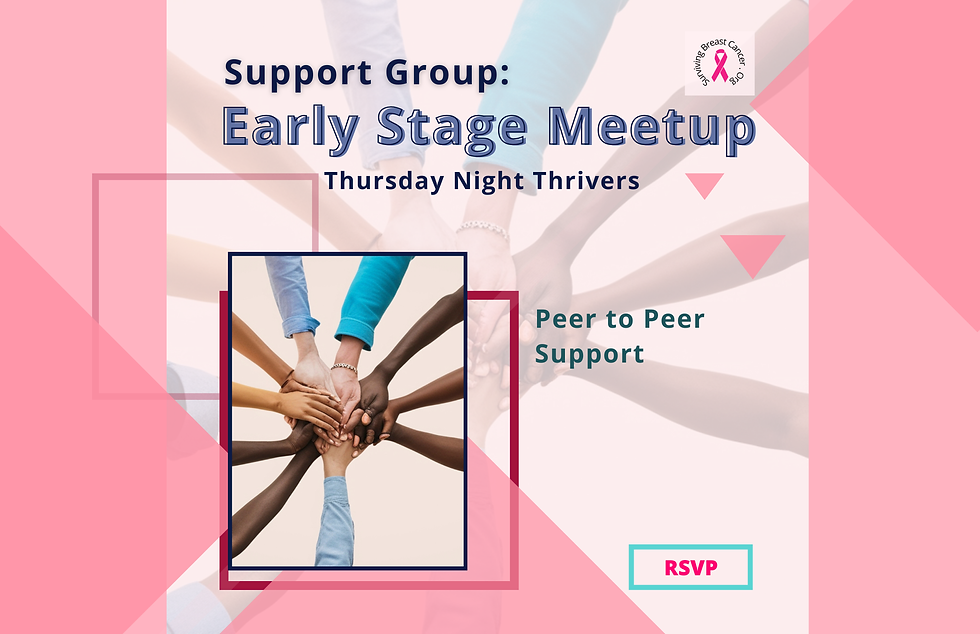Why a Second Opinion Matters for Breast Cancer
- Surviving Breast Cancer

- Apr 30, 2024
- 4 min read
Updated: Oct 6, 2025

Receiving a breast cancer diagnosis can evoke a complex array of emotions. Initially, you may feel shock and disbelief. Those feelings can quickly give way to fear and anxiety, sadness or grief, anger, and frustration. It can seem unfair and have you questioning, “Why me?” In addition to the mix of emotions, you’re also trying to absorb mind-boggling mountains of information.
The combination of emotions, urgency, and the perceived authority of medical professionals causes many people to feel locked into the first opinion they receive, making them reluctant to seek a second opinion, either due to emotional distress, financial concerns, or the fear of offending their doctor.
Some people may hesitate to seek a second opinion or discuss their diagnosis with another doctor, fearing it might upset or offend their current physician. It’s important to understand that feeling uncertain and wanting reassurance through additional consultations is completely normal and essential to managing your healthcare.
For example, you might express your concern by asking your doctor, “Is it right if I consult another specialist to get a second opinion on my treatment options?” Most doctors will respond positively to such questions, affirming that seeking a second opinion is prudent and can help ensure the best treatment plan. They might say, “Absolutely, getting a second opinion can provide additional perspectives that might be beneficial, and I can recommend specialists who have experience in this area.”
Medical professionals generally encourage seeking a second opinion and view it as a standard part of medical care, especially for significant diagnoses like cancer. You should feel empowered to pursue all avenues to help you feel more confident and informed about your treatment decisions.
Breast cancer is a complex disease with various treatment options, each with risks and benefits. Different specialists might have varying experiences and expertise, which can lead to alternative insights or treatment approaches. The process can provide reassurance, confirm a diagnosis, and help you understand the full range of treatment options available. A second perspective can offer reassurance about your diagnosis and treatment plan or reveal alternative options previously unknown.
Continue reading to learn about the importance of obtaining a second opinion regarding a breast cancer diagnosis, illustrating how it’s not just beneficial but essential for comprehensive care. You will also learn about how to get started seeking a second opinion. Remember, it’s your health and your decision; seeking clarity and comfort through additional expert advice is a proactive step toward your well-being.
The Initial Diagnosis
An initial diagnosis of breast cancer typically involves a combination of clinical examinations and diagnostic tests. The process usually begins when an individual or a healthcare provider identifies symptoms, such as a lump in the breast or a change in breast shape or texture. A healthcare professional performs a clinical breast exam to check for lumps or other physical changes.
If there is a lump or significant concern based on the initial examination, your healthcare team may recommend imaging tests like mammography, ultrasound, or magnetic resonance imaging (MRI). These imaging techniques help visualize the breast’s internal structure and identify abnormalities.
If these tests indicate the presence of potential cancer, a biopsy is usually the next step. During a biopsy, a small tissue sample from the suspicious area is removed and examined under a microscope to check for cancer cells. The biopsy is a critical component of the diagnosis, as it confirms whether the abnormality is cancerous and, if so, determines the specific type and characteristics of the breast cancer.
The information is crucial for planning appropriate treatment. The diagnosis process may also include additional tests to assess your overall health and check for signs of cancer spread.
Why a Second Opinion Matters
According to BreastCancer.org, up to 40% of breast cancer patients had a change in their diagnosis when they sought a second opinion. Reasons why a second opinion is so valuable include:
Confirming your diagnosis and treatment plan: A second perspective can provide reassurance that you’re on the best possible path.
Discovering alternative treatment options: Doctors at different facilities may be aware of emerging therapies you and others don’t know about. They may also have different experiences and perspectives on treatment options, offering a broader range of choices.
Improving your chance for clinical trials: Consulting another specialist can improve your odds of learning about potentially beneficial clinical trials.
Gaining peace of mind: Another opinion can give you confidence in your diagnosis and treatment plan, relieving stress.
How To Seek a Second Opinion
Seeking a second opinion for breast cancer is an essential step that can provide additional insights into your diagnosis and treatment options, empowering you to make more informed decisions about your care.
Consult your primary doctor: Your doctor can refer you to another specialist.
Look for specialists: Consider experts with extensive experience treating breast cancer, particularly those involved in research and teaching. When you meet the new specialist, ask questions about their treatment approach, the potential benefits and risks, and any alternative treatments they might suggest.
Prepare your medical records: Ensure you have all your medical reports, scans, and test results to help avoid unnecessary repeat tests and provide a comprehensive view of your condition.
Count On Us for Information, Resources, and Support
When facing something as serious as breast cancer, it pays to gather as much expert knowledge as possible to make the most informed decisions about your health. Don’t hesitate to consult another doctor for a second (or third or fourth) opinion until all your questions are fully answered.
Whether you’re newly diagnosed with breast cancer, are navigating survivorship, or are the loved one of someone experiencing breast cancer, you can count on SurvivingBreastCancer.org to keep you informed. We provide educational information to help you better understand symptoms, testing, treatment options, surgery, etc., and podcasts that feature professionals, advocates, and caregivers who share valuable information.
Your donations enable SurvivingBreastCancer.org to offer resources and support every day, every month, and every year.
Note: This article is designed to provide general information and not replace professional medical advice. Always discuss your options with your healthcare provider.
Learn More:
On the Podcast: Breast Cancer Conversations
Understanding and Coping with Medical PTSD in Cancer Care
SurvivingBreastCancer.org Resources & Support:










